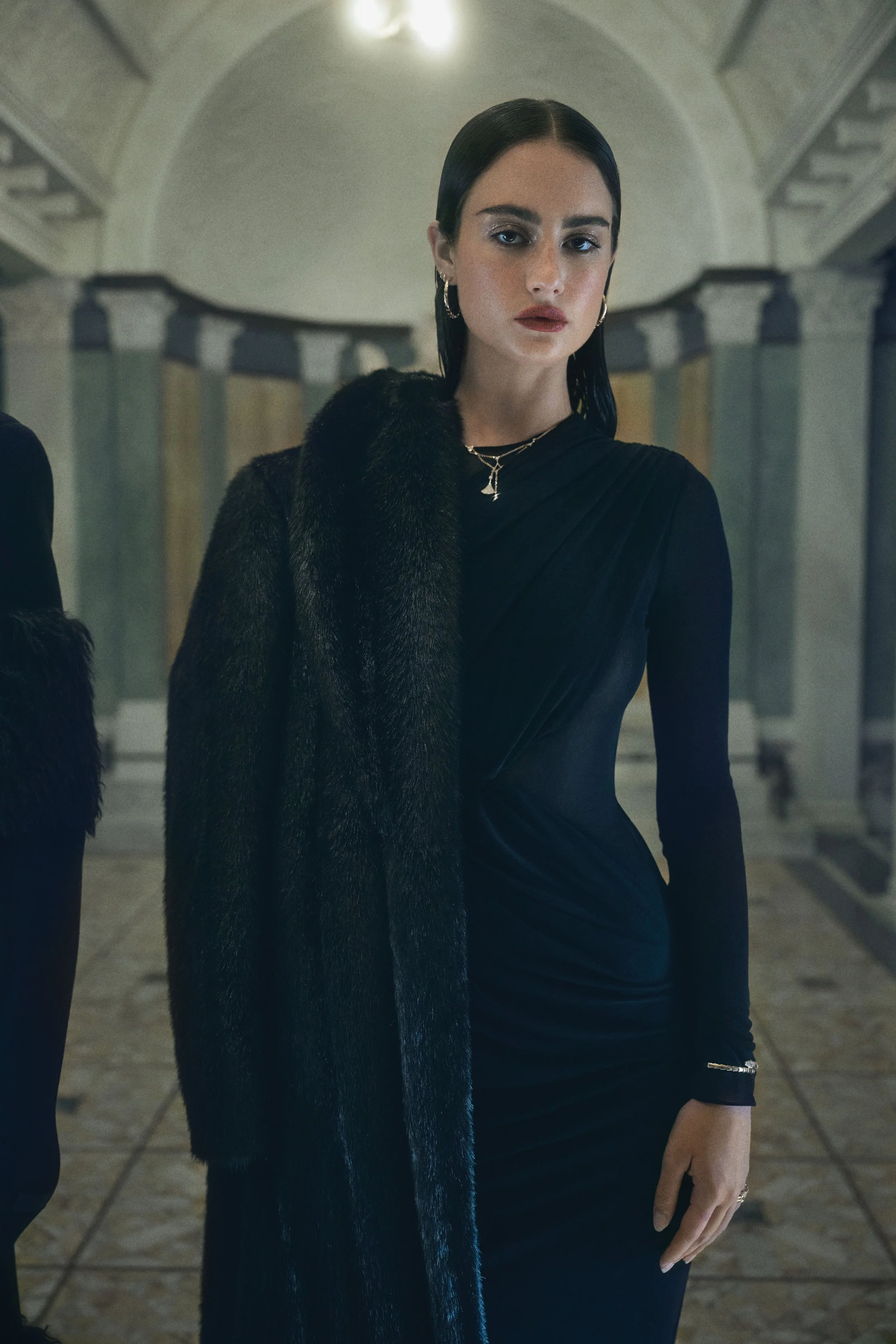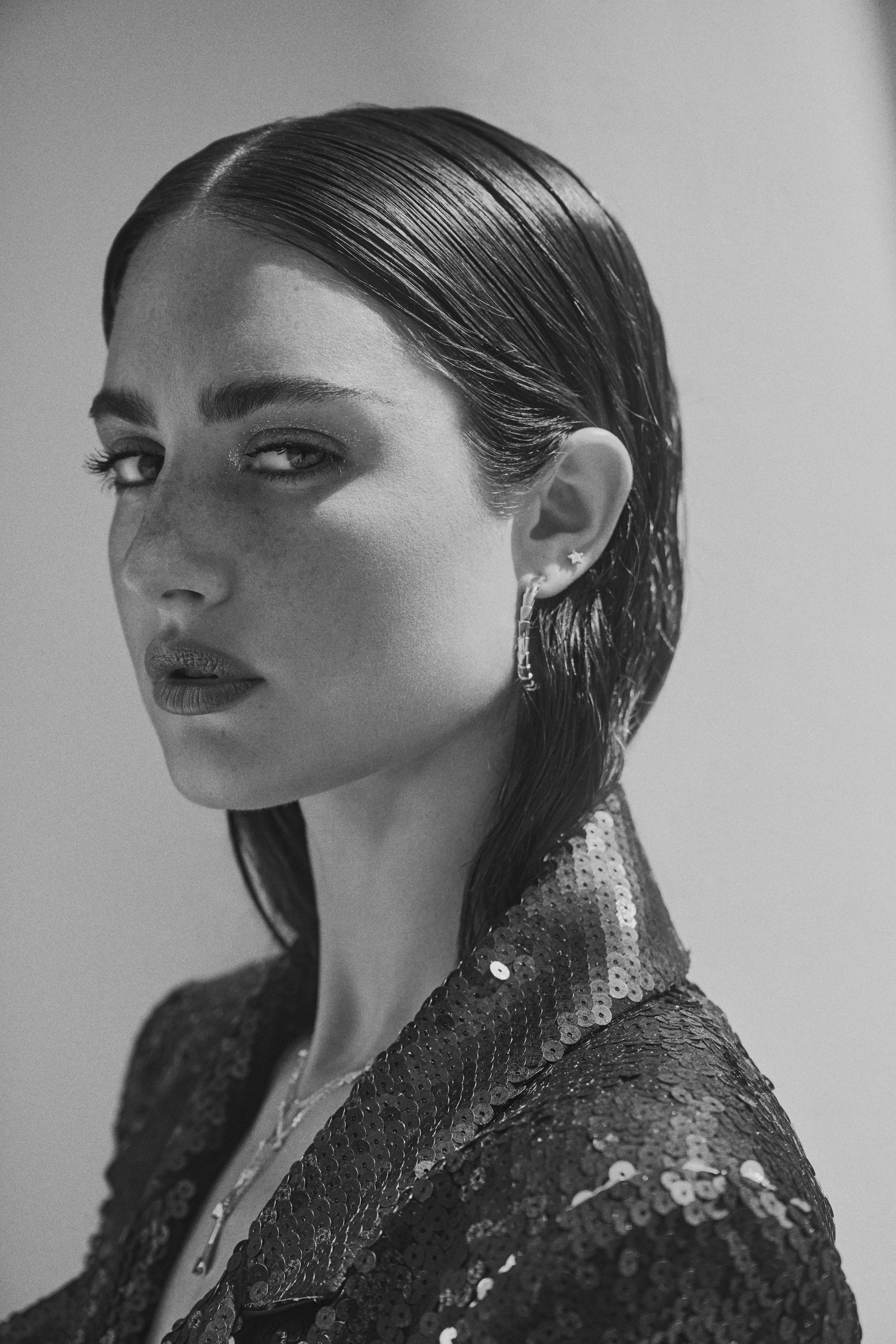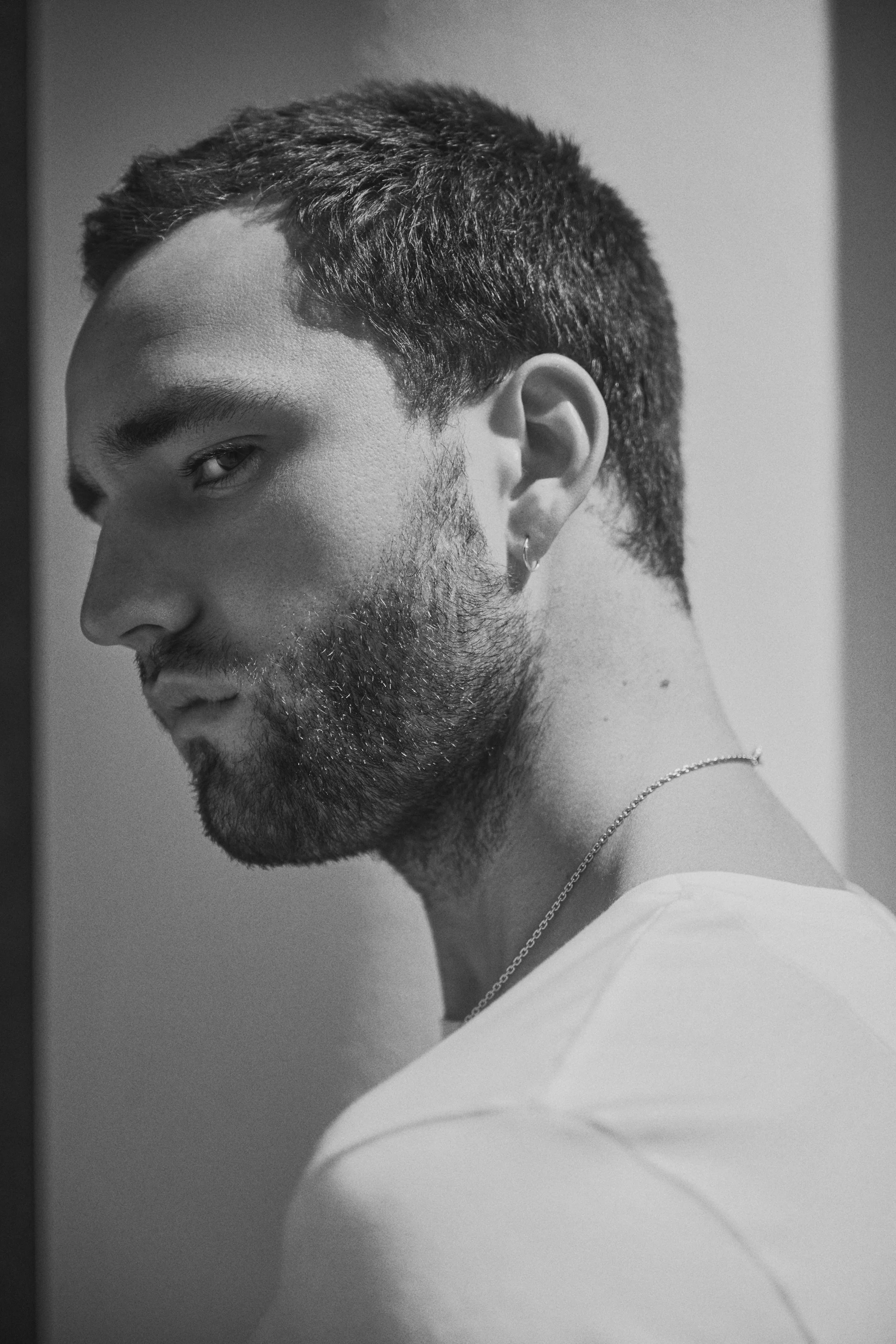Grace Van Patten & Jackson White | The Ripple Effect
by Bree Castillo
Left to right: Jackson wears PRADA coat, turtleneck, pants, and boots and BVLGARI necklace. Grace wears SAINT LAURENT BY ANTHONY VACCARELLO coat, dress, and shoes and BVLGARI earrings, necklace, bracelet, and rings.
It tasted like love, but it wasn’t. It was just a lie under the guise of something tender and true. And when you’re young and naïve to love, you can’t really tell the difference. We’ll use the bodies of others and our own as maps to find ourselves, only to find nothing. And one day, when enough time has passed we’ll realize it wasn’t really love—just the obsession of feeling something for the first time.
This near universal experience is unpacked with actors Grace Van Patten and Jackson White in support of their new Hulu drama series, Tell Me Lies. Based on Carola Lovering’s best-selling novel of the same name, Tell Me Lies follows Van Patten (previously known for Nine Perfect Strangers and Under The Silver Lake) as young Baird College freshman Lucy Albright. In her first year of college, she meets Stephen DeMarco, played by White, who starred in Mrs. Fletcher and action-thriller Ambulance. Together, they embark on the entanglements of young love and lying without consequence. The ten-episode drama-thriller begins with a death of a classmate and documents how a single lie feeds on the insecurity of not knowing who you are, secrecy between friends, and for some characters, an awakening.
Grace wears SAINT LAURENT BY ANTHONY VACCARELLO coat, dress, and shoes and BVLGARI earrings, necklace, bracelet, and rings.
Following Lucy and Stephen’s relationship over the span of eight years, Tell Me Lies is not a love story, but a story in which everyone wants to be loved, and no one knows how to do so correctly. White shares, “We’re not glamorizing anything or glorifying any sort of toxic behavior, but we are telling a story about these people who meet at this perfect time and project everything onto each other.” Van Patten chimes in, “And it doesn’t necessarily mean it’s right, and that you should follow that feeling, but it’s really hard to turn away from that and not indulge in it.”
It’s hot and toxic and 2007—BlackBerry phones still exist, no one talks about their feelings, and s-e-x is a word we share only in hushed tones. Flaunt sat in on Van Patten and White’s reflections on what we talk about when we talk about love—when that love might not have the best intentions—and the exploration of the ethics of lies. Because maybe some lies are meant to be told, if only just to save the moment or to make it last a little longer.
Left to right: Jackson wears PRADA coat, turtleneck, pants, and boots and BVLGARI necklace. Grace wears SAINT LAURENT BY ANTHONY VACCARELLO coat, dress, and shoes and BVLGARI earrings, necklace, bracelet, and rings.
Jackson wears PRADA coat, turtleneck, pants, and boots and BVLGARI necklace.
Tell Me Lies relies so heavily on your chemistry, which is deeply felt and seen on-screen. Did you both click right away?
Grace Van Patten: It was pretty instant in the chemistry read. Stephen is such an intense and hard character to play for an actor, and Jackson walked in and just understood him so well and brought such life to him and vulnerability to him that none of us had seen. And I just admired that so much, and was so impressed by it. We built our own relationship from just hanging out all the time with the cast and talking about the show. We became really comfortable with each other instantly.
Jackson White: And then walking into it, I saw how confident and good and talented Grace was. And I knew I wanted to be a part of it more than anything. I think she really set the tone from the start of what this show was gonna be. And I was just so excited to try and meet her on that level. It was instantly very easy to get along and talk about it. It was like we were old friends or something.
GVP: It’s so special. Also with this job specifically reading the script, I was like, ‘Oh my god, I really hope I like this guy.’ He’s so scary. [The show] is so intimate, so vulnerable, and we have to be so mean to each other. So thank god we got along.
TOD’S coat, GIVENCHY dress, CHRISTIAN LOUBOUTIN boots, and BVLGARI bracelet, earrings, and rings.
TOD’S sweater, PRADA boots, and BVLGARI watch.
What was your experience of reading the book and the script, and then bringing Lucy and Stephen into real life?
GVP: I really wanted to try and show that strong people can get caught in a really toxic relationship too—it’s not just the weak girl. Any type of person can be fooled. I feel like that was a difference from the book that I really loved and wanted to show.
JW: But that’s so much your view too, Grace. Grace is such a strong, confident person that I feel like you brought all the dimensions to that.
GVP: Hey, thanks. We’re nice to each other in real life.
JW: It’s easy to see [Stephen’s] storyline in the book and write it off as a little villainous or sociopathic. And I think my excitement was just turning him into a dimensional, complicated person. We really early on just talked about making him a really enigmatic, confusing character study. And that was the challenge, that was what my work was. How do I make on paper bad situations, have some type of vulnerability to it or confusion to it.
Grace wears VALENTINO top, pants, and shoes.
HERMÈS jacket, sweater, pants, and boots, BVLGARI watch, and OLIVER PEOPLES sunglasses.
Did you both identify with your characters or any facets of your character?
JW: Grace and I have different probably outlooks on that. I really felt like I was putting a costume on. I spoke a little differently, I walked a little differently as Stephen. But obviously, there’s gonna be elements of yourself in anything you do. But no, for me, it really felt like I was tapping into a different guy.
GVP: I think I’m a little bit more like Lucy than you are like Stephen. I definitely connected to Lucy in a lot of ways. Especially my younger self. Like my 18-year-old self, which is when you meet Lucy. And relating to her inability to express her emotions and seeing that vulnerability was this weakness. You meet Lucy and she’s very closed off and has built up this really strong emotional wall due to her past trauma. And I just love that. I’ve had a different journey, but I’ve gone on a journey that led me to having no control over my emotions in a good way. Seeing that vulnerability is really powerful and beautiful and accepting the emotions and not just pushing them down.
CHANEL dress and BVLGARI earrings and necklace.
Tell Me Lies portrays the depths of toxicity in relationships—what does the show say about being young and naïve to love? And how has that now been reflected with social media?
GVP: Thank god Lucy and Stephen didn’t have social media. Thank god it was set in 2007 because adding Instagram into their issues would be a whole other set of problems.
JW: I also think it gave him an excuse to treat each other the way they did because they weren’t put on blast. It wasn’t publicized or posted. They just had BlackBerries, and he specifically could get away with more. Do you think Stephen would have an Instagram, though? I feel like his Instagram would be like a picture of like a beer bottle with a cigarette in it, and like three months later it’d be a picture of his weird old boots.
GVP: [For Lucy,] it’d be like her dorm room. And then as the season goes on, it’d be like an intense thirst trap to get Stephen’s attention—like a lot of selfies and push-up bras. The Victoria’s Secret bombshell. Those were really big then, I feel like she’d use it to get Stephen’s attention, which is really sad, but I think accurate.
HANRO t-shirt, LOUIS VUITTON MEN’S pants, and BVLGARI necklace and watch.
You can definitely see a lot of characters discovering their sexuality, and navigating this new facet of themselves.
JW: For the most part, I think characters aren’t too comfortable in their skin. I think that’s part of the reason why so much goes wrong is that they’re projecting and they’re putting all their insecurities and comfortabilities on each other. But I think as the people that had to go to work and play them, I think we had to get really comfortable and vulnerable and open to playing those types of people.
GVP: I think a huge part of why Lucy latches onto Stephen is because she goes through this whole sexual awakening with him. And I think at that age, it’s really easy to mistake that for love and pure connection and thinking. New feelings means that you should be with this person because this person is making me feel something new and something different. I really think that’s why Lucy becomes so kind of obsessed with getting validation from him and wanting to have him and have it work out—because I think that’s a huge part of that age. And when you’re sexually awakened and you feel more comfortable in your body, but you’re really not, it’s kind of this false confidence that you know who you are now. I think it’s easy to follow the wrong path with that.
Left to right: Grace wears CHANEL dress and BVLGARI earrings, necklace, and rings. Jackson wears HANRO t-shirt, LOUIS VUITTON MEN’S pants, and BVLGARI necklace and watch.
I’ve never thought of that: the young love craze is more of an obsession of feeling something for the first time.
GVP: And at that age, you haven’t experienced a lot. Especially for Lucy, because she’s been numb for so long and the contrast of feeling nothing to all of a sudden feeling so many new, exciting feelings. I think it just completely tricks her mind into thinking that this person should be in her life, and it’s helping her finally experience things.
And since that’s all she knows, she doesn’t know that it could be anything else—that maybe this isn’t exactly love?
GVP: Even now, it’s like any new feeling, especially when you get older and you start to experience more things—when you feel a new feeling, it feels crazy. It feels so exciting. And it doesn’t necessarily mean it’s right and that you should follow that feeling, but it’s really hard to turn away from that and not indulge in it.
ALEXANDRE VAUTHIER dress and BVLGARI necklace, bracelet, and rings.
Would you consider Tell Me Lies as this cautionary tale or more of a reflection of an experience? A sort of flashback?
JW: I think it’s all of that. I think it’s a slice of life between a really toxic set of people. I think it’s their real anxieties, their real relationship situations. What I’m happy about that people are getting from it is that they understand it. They understand what it is, what we’re doing. The timing of that meeting is the perfect recipe for what happens. If the viewer has been through something like this, which is real enough and visceral enough that it reminds them of that experience, maybe it helps them think about it, or heal from it, or reflect on it—maybe it’s a cautionary tale, or maybe it’s just entertainment and it’s not taken to heart.
GVP: I think you said it beautifully. I think that’s all hopefully what people take from it. And also what we talk about a lot is that if this group of friends would be honest with themselves, and communicated their feelings, and just talk with one another, then none of this would’ve ever happened. I think that was a different time. I think it was harder to do that. And now we live in a place where speaking about your feelings is more accepted and being open is really valued. Hopefully, it inspires people to communicate and not lie and encourages people to be open with their feelings and discuss.
HERMÈS jacket and pants, TOD’S sweater. and BVLGARI watch and ring.
HANRO t-shirt and BVLGARI necklace.
Now that both of you have some space from being in that mind space and being 18, what have you learned so far? Is there something that is echoing in your head in your mid-twenties?
JW: It’s so hard to track how far you’ve come. I just feel like I’m 16 years-old all the time. I have better coping mechanisms in my life now. I know for a fact that I prioritize taking care of myself a lot more. And instead of pushing through the emotion, just sit with it and process it. I think the one thing that changes in life is that it just slows down a little bit. You become friends with the boring a little bit more as you get older. I’m just more down with doing nothing and thinking about things before I say them or doing them.
GVP: I’m definitely still on the path of growing in a lot of ways. I feel like I was kind of talking about how I relate to Lucy. I’ve really learned to accept my emotions and become friends with them and not turn any of them away at the door and kind of let them all in and talk to my therapist about it. I think I’ve definitely grown emotionally in that way. I feel like it’s only been the past few years that I felt the need to really take care of myself and kind of learning what makes me calm and what makes me feel grounded and safe. And just continuing to figure that out.
Left to right: Jackson wears PRADA turtleneck, pants, and boots and BVLGARI necklace, watch, and ring. Grace SAINT LAURENT BY ANTHONY VACCARELLO dress and shoes and BVLGARI earrings, necklace, and rings.
I’m glad that you both have found ways to rescue yourself. And now I have to ask would you consider yourselves good liars? And with that, do you think that some lies are necessary—maybe to rescue the moment or maybe save someone’s feelings? Or is it better to be honest?
GVP: That’s so hard. I think that it’s always best to be honest, I think it always helps in the long run, even if it makes it harder in the moment. But again that’s easier said than done, and everyone makes mistakes and everyone lies. But yes, definitely, honesty is always better.
JW: Being uncomfortable in the moment is way better than going the distance for the lie. There’s nothing scarier than that—that’ll mess up your whole psyche. And then you have to remember your lies and keep spiraling and internalizing.
ALEXANDER MCQUEEN coat, shirt, and pants, CHRISTIAN LOUBOUTIN shoes, BVLGARI watch, and ring, and OLIVER PEOPLES sunglasses.
TOD’S coat, CHRISTIAN LOUBOUTIN boots, and BVLGARI bracelet, earrings, and rings.
It is so easy to get caught up and internalize everything, so how do you keep your heart open these days?
GVP: For me, it’s doing things I love and that makes me happy and being surrounded by the people I love and that support me. And just staying open and curious and trying not to close my mind off in any way.
JW: I’ve been resisting the urge to put myself anywhere. I don’t want to be and move for the sake of moving. And I think I’ve just been trying to start every morning by slowing down instead of speeding up.
GVP: Yeah. I feel like, especially at this time for us, it’s so easy to kind of turn the excitement for what’s going on and the show into go, go, go, and let’s do things and let’s celebrate. I think it’s really important to step back and take a breath and be present as much as possible. And it’s the hardest thing in the world, but I think it’s really important when it’s a big moment in your life to not rush through it and to really let it sink in and process it.
JW: I’ve been trying to call people if they pop into my mind. If I have a thought about someone, that means something to me, I’m trying to just stay present and connect. My instinct, a lot of the time in my life, in all aspects of my life, is to isolate and to sit with emotions and keep them in. If I’m nervous or timid about something, I want to stay secluded. So I’m trying to just be more communicative and reach out more.
ALEXANDER MCQUEEN shirt and pants and BVLGARI watch and ring.
Photographed by Carlos Serrao + Monica May at Beauty And Photo
Styled by Monty Jackson at A-Frame Agency
Written by Bree Castillo
Makeup: Nikki Deorest at The Wall Group using Valentino Beauty
Hair: Cameron Raines at Forward Artists
Groomer: Barbara Guillaume at Forward Artists using Circa 1970
Producer: Amy Ground
Digital Tech: Damon Loble
Retoucher: Hyperion Digital
Stylist Assistants: Jake Mitchell, Mars Espinoza, And Haili Pue
Photographer Assistants: Ron Loepp, Simon Mcdermott-Johnson, Embry Lopez And Jorge Espinoza.
Production Assistant: Damien Pettway
Location: Getty Villa Museum In Pacific Palisades
Special Thanks To J. Paul Getty Trust, Desiree Zenowich, and Shannon Iriarte




















